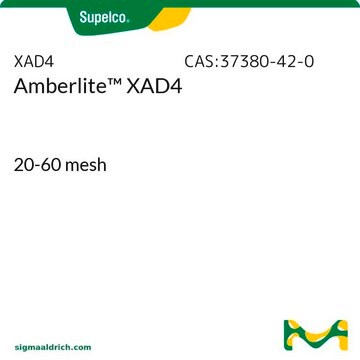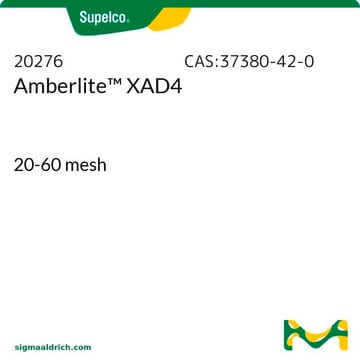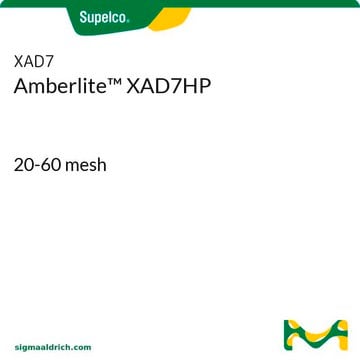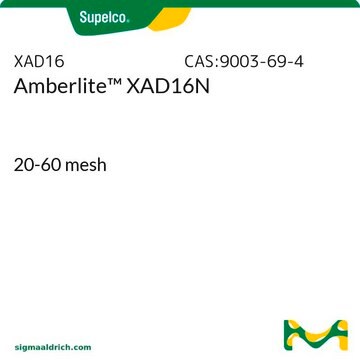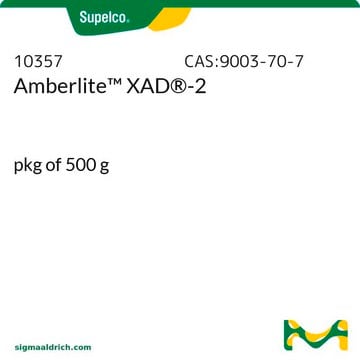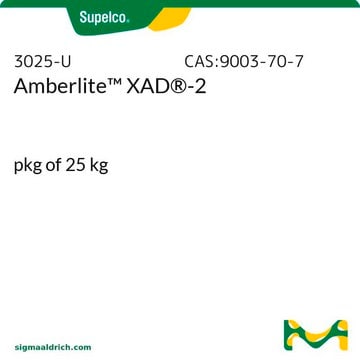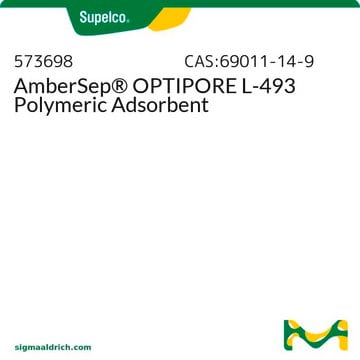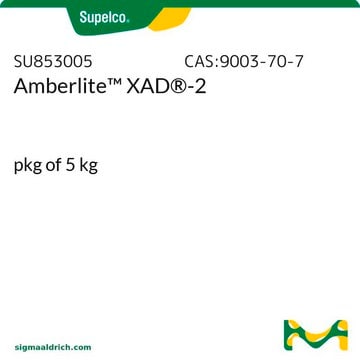Recommended Products
Product Name
Amberlite™ XAD4,
form
beads
autoignition temp.
800 °F
technique(s)
LPLC: suitable
surface area
750 m2/g
loss
~55% loss on drying, 110 °C
matrix
styrene-divinylbenzene
matrix active group
polymer
particle size
20-60 mesh
pore size
~0.98 mL/g pore volume
100 Å mean pore size
density
1.02 g/mL (true wet)(lit.)
1.08 g/mL (skeletal)(lit.)
separation technique
reversed phase
Looking for similar products? Visit Product Comparison Guide
General description
Nonionic macroreticular resin that adsorbs and releases ionic species through hydrophobic and polar interactions; usually used under isocratic conditions.
Application
Amberlite XAD-4 has been used in the clean-up procedure prior to high performance liquid chromatography-evaporative laser scattering detector (HPLC-ELSD) analysis of mycotoxin fumonisins in corn products. It has also been used as a solid sorbent to trap imidacloprid and its metabolite 6-chloronicotinic acid from greenhouse air prior to their determination by HPLC coupled to diode array detector (DAD).
Polyaromatic adsorbent for small hydrophobic compounds, surfactants, pharmaceutical manufacturing, phenols, chlorinated organics, pesticide removal and recovery, and organic removal from aqueous food streams.
Other Notes
Two particle sizes are available:
Mesh 20-60 are Cat. Nos. 20276, 10358, XAD4
Mesh 20-50 is Cat. No. 06444
Mesh 20-60 are Cat. Nos. 20276, 10358, XAD4
Mesh 20-50 is Cat. No. 06444
Legal Information
Amberlite is a trademark of DuPont de Nemours, Inc.
Storage Class Code
11 - Combustible Solids
WGK
WGK 3
Flash Point(F)
Not applicable
Flash Point(C)
Not applicable
Personal Protective Equipment
dust mask type N95 (US), Eyeshields, Gloves
Choose from one of the most recent versions:
Already Own This Product?
Find documentation for the products that you have recently purchased in the Document Library.
Customers Also Viewed
Analysis of mycotoxin fumonisins in corn products by high-performance liquid chromatography coupled with evaporative light scattering detection.
Wang J, et al.
Food Chemistry, 107(2), 970-976 (2008)
Antoine P Trzcinski et al.
Journal of environmental science and health. Part A, Toxic/hazardous substances & environmental engineering, 46(13), 1539-1548 (2011-10-14)
In this study, various methods were compared to reduce the Chemical Oxygen Demand (COD) content of stabilised leachate from a Submerged Anaerobic Membrane Bioreactor (SAMBR). It was found that Powdered Activated Carbon (PAC) resulted in greater COD removals (84 %)
Muhammad Afzal Kamboh et al.
Journal of hazardous materials, 172(1), 234-239 (2009-07-31)
The present study describes a novel synthetic method for the immobilization of calix[4]arene (II) onto the surface of modified Amberlite XAD-4 resin (4), which does not require the derivatization of calixarene moiety. The novel calix[4]arene based resin (C4 resin) 5
A S Ghatbandhe et al.
Journal of environmental science & engineering, 50(2), 163-168 (2009-03-20)
Adsorption equilibrium, kinetics and thermodynamics of 2,4-dichlorophenol (2,4-DCP), one of the most commonly used chlorophenol, onto bituminous coal based Filtrasorb-400 grade granular activated carbon, were studied in aqueous solution in a batch system with respect to temperature. Uptake capacity of
Imdadullah Qureshi et al.
Journal of hazardous materials, 164(2-3), 675-682 (2008-10-03)
The article describes a convenient synthesis and Cr(VI) extraction efficiency of a novel p-tert-butylcalix[8]areneoctamide impregnated Amberlite (XAD-4) resin. Using p-tert-butylcalix[8]arene macrocyclic building block, two strategies have been developed; i.e., derivatization of p-tert-butylcalix[8]arene framework with sophisticated ionophoric groups having efficiency to
Our team of scientists has experience in all areas of research including Life Science, Material Science, Chemical Synthesis, Chromatography, Analytical and many others.
Contact Technical Service